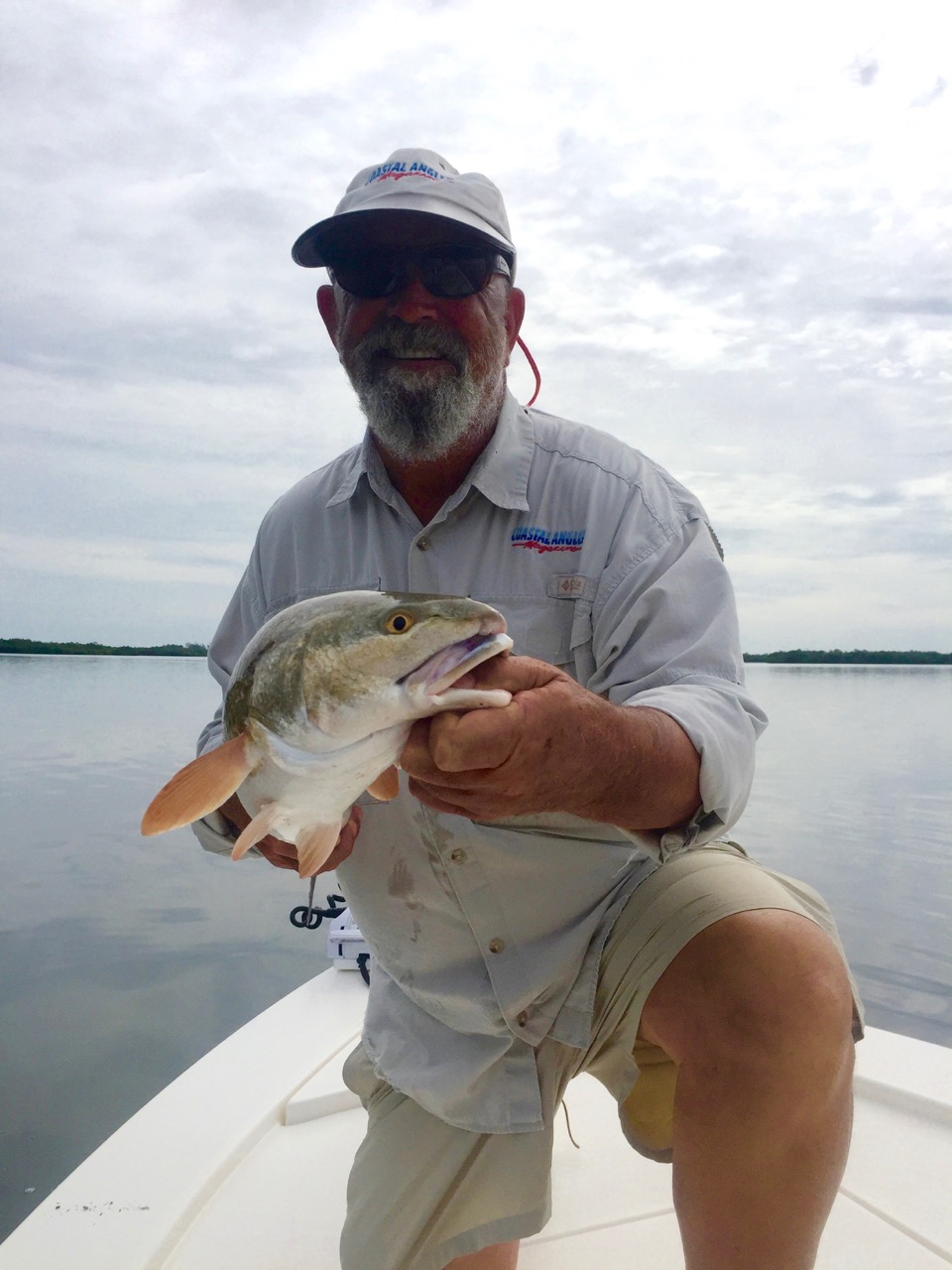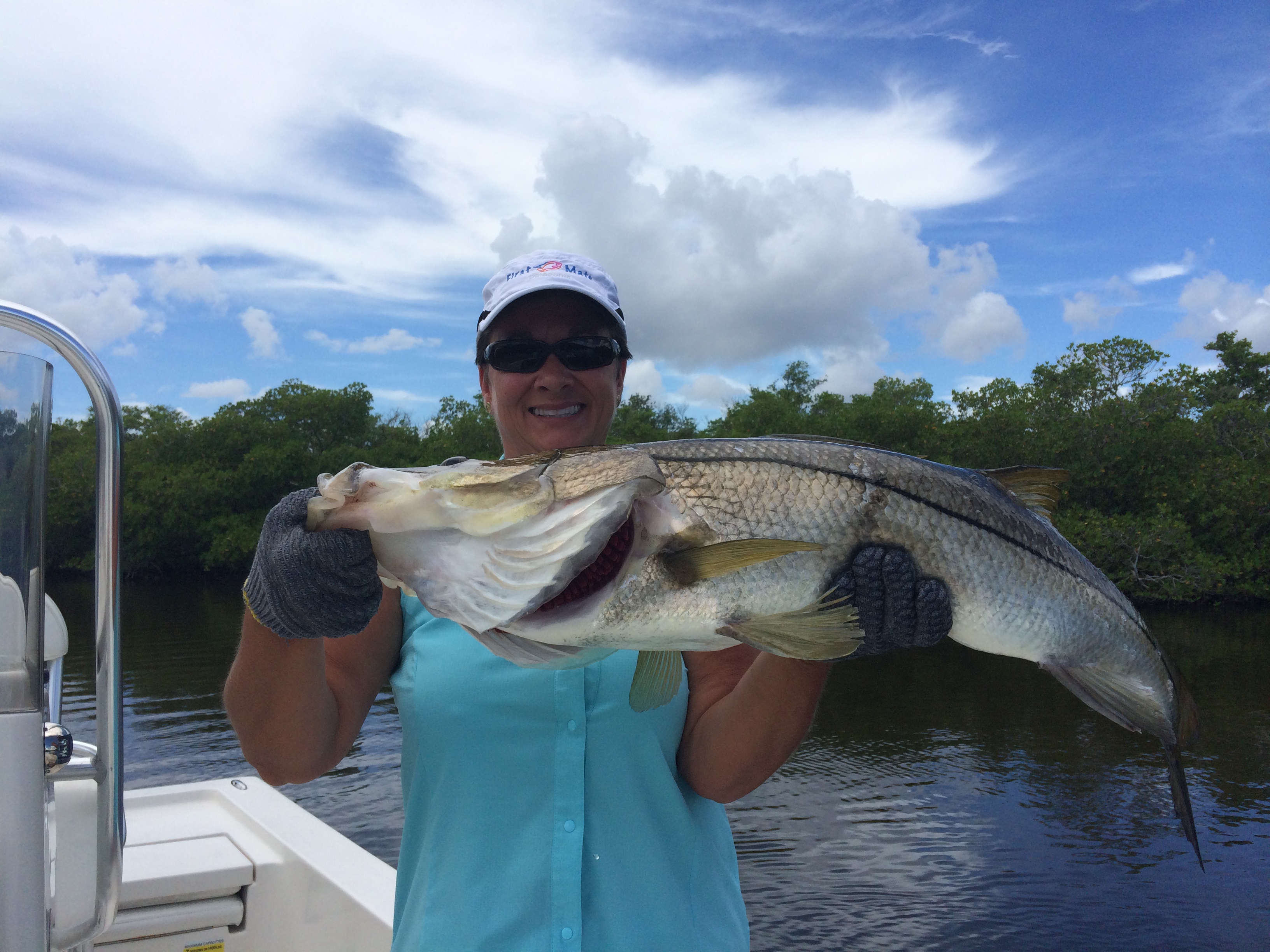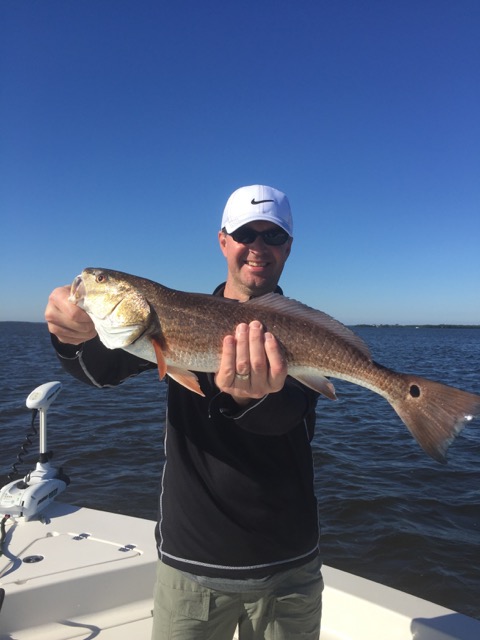by Captain Terry Fisher

It is that time of year, or the beginning, when huge numbers of big snook and bigger redfish (‘Reds’) move into the back waters of Pine Island Sound and other secluded estuaries north and south to feed and spawn. They are aggressively eating shrimps, crabs and baitfish. Big snook will also be found just off of the beaches of the outer islands of Sanibel, Captiva, North Captiva, Cayo Costa. This scenario plays out all the way north to Tampa Bay and south of Naples. Areas include, but are not limited to, Bull and Turtle Bays (northwestern area of Charlotte Harbor), the eastern areas of Charlotte Harbor (along the sand bar of Punta Gorda), Matlacha Pass, south to Estero Bay and the Everglades.
Everyday in July (weather permitting) should offer good opportunity for a ‘fish of a lifetime’ to anglers that target the above-mentioned game fish. I believe a few of the most effective strategies and tactics are as follows.
- Work the top half of the incoming and outgoing tides. I prefer to fish for Snook on an outgoing tide and ‘Reds’ on the incoming tides.
- When possible, fish the higher tides of the month and during both new and full moon phases.
- Do not sit in one spot too long. Move around (quietly) to different locations until you find the game fish. Work points of islands, fish in and around ‘dead’ wood. Fish a presentation very close to or under mangroves. If pinfish and mangrove snappers are biting, move on, as it is unlikely that big snook or ‘reds’ are at that location.
- Fish the windward side of islands, keys and structure when possible.
- ‘Free’ line live pilchards and threadfins for best snook results. I like to use circle hooks, but ‘J’ hooks are just as good. Use sizes 1/0 to 3/0 depending on the size of the bait (not the fish you hope to catch). The bait needs to have a natural presentation and oversized hooks will defeat this purpose. Large shrimp, crabs, cut pinfish or cut ladyfish should produce ‘reds’. If large (jumbo) size shrimps are available in the waters you fish, that is likely to be the ‘bait of choice’. Otherwise, try the other baits mentioned above. However, regardless of the bait, Redfish presentations should be placed on the seabed or suspended under a cork. Not ‘sexy’, but very effective.
- Artificial baits such as ‘weed-less soft plastics, twitch, top water, spoons and crank baits can all be effective, but usually not as effective as live bait.
- Re-visit previous stops at different stages of the incoming and outgoing tides (the fish simply may not have arrived at that time).

Over periods of time fish will relocate (if not more than a few yards) given a number of variables and changes in the areas habitat, including, the amount of fishing pressure, changes in structure (dead wood and oyster clusters, etc.) sea-grasses (amounts of and types) and cover (mangroves). Other factors include wind speed, wind direction, water level and water clarity.
I am constantly looking for new ‘haunts’ that hold snook and ‘reds’. Recently, my 1st Mate Vicki, accompanied me on a trip to seek out new, productive locations. She has not fished much this year and was somewhat apprehensive as to her ability to make good presentations (casting) close to the mangroves. We worked the top half of the incoming tide. She fished on the bottom with a 1/4 oz. Strike King Jig Head with shrimp a jumbo shrimp. She used a weighted jig so that the strong, incoming current would not move her presentation from under or near the mangrove roots (where most fish swim or lie in ambush). I fished a ‘cork’ with a suspended, weighted jig, allowing it to drift with the current, along the mangrove roots.
Shortly after arriving at the first ‘spot’, I landed a decent size redfish and a couple of small snook. I was on the bow of the boat, looking back and noticed that Vicki was struggling with her casting. Too many miscues into and short of mangroves prompted me to move several yards to another location so as to let things settle down a bit before trying the ‘spot’ again.
Thirty minutes or so later, we returned to the original location where I had seen and heard fish feeding deep in mangrove roots. I suggested to Vicki to place her bait deep into a specific opening. Within a minute or so, her Shimano 3000 series, spinning reel was screaming out 10lb. test braid deeper into the mangroves. She was doing everything she could to turn the head of her 38” ‘monster’ female snook. Fortunately, we were using 40lb. test Seaguar, Fluorocarbon. I stood on the bow in amazement as to how fast and far back into the trees, this huge fish swam. I thought that Vicki had no chance of getting it out.

The water was shallow and with every head turn, the noise and splashing water was characteristic of a ‘dolphin’ feed. It took all of the strength Vicki had to hold the light tackle rod and continue to ‘reel’, at every opportunity bringing the fish toward the fringe of the mangrove line. I figured at any moment the line would snag and break or the fish would wrap around a root. (Over the years, I have had many experienced anglers on board, but few good enough to maintain the required composure and intensity to overcome the many obstacles required to land a ‘fish of a lifetime’).
However, Vicki did not over analyze the situation, but took the ‘hand’ she was dealt and kept the heat on! Finally, I came to my senses and realized that she might actually pull this feat off. I raised the Power Poles, put the trolling motor in fast-forward and told her to ‘hold on’, while the boat helped bring the fish into a clearing. Two or three minutes later we boated, measured and released unharmed, her ‘monster’ snook. Great Job Honey!
In closing, I had the recent honor and pleasure of fishing with Ben Martin, Editor-In-Chief of Coastal Angler Magazine of Indian Harbor Beach, Florida. Ben is an accomplished angler with ‘world-wide’ experiences. Ft. Myers, Coastal Angler Publisher, Nadeen Welch, arranged and accompanied us on the adventure. They are pictured here with snook and redfish caught on the same techniques and strategies discussed within this article.
This is Captain Terry Fisher of Fish Face Charters. Website: www.fishfacecharters.com. Contact me at 239-357-6829 or email me at fishfacecharters@yahoo.com to schedule a charter to catch your ‘fish of a lifetime’. I am also available as ‘Captain for Hire’ (by the hour) on your vessel for safety, navigation, fishing techniques and actual locations to ensure catching fish is a daily and regular event.
